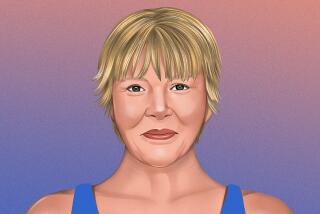Diana Nyad’s Cuba-to-U.S. swim has lessons for us all
- Share via
Endurance swimmer Diana Nyad was forced to bail on her historic Cuba-to-U.S. swim on Tuesday, but there’s an important life lesson in that setback: Enjoy the journey.
Nyad, 61, ended her 103-mile swim after about 30 hours due to problems both physical and environmental: an asthma attack, a painful shoulder and choppy waves made her abandon the effort, which would have been the first such swim without a shark cage.
Although quoted as being deeply disappointed, Nyad told CNN: “I was the best person I could be ... that’s the message. I dug down, I dug deep ... Whatever you’re doing, do your job well.”
That, says sport psychologist Eddie O’Connor, is what it’s all about.
“It’s not so much about achieving your goal but how you went about achieving your goal,” said the Grand Rapids, Mich.-based fellow and consultant with the Assn. for Applied Sport Psychology. “When you can focus on the process and give 100%, you walk away with such a sense of growth and accomplishment, knowing that you gave it your best. She pushed her mind and her body, and she’s not going to have any regrets.”
Enjoying the process is numero uno when it comes to any athletic endeavor, O’Connor said. “You’re going to have the most success if you enjoy the process.”
And when success isn’t achieved, it’s perfectly normal for an athlete to feel a sense of frustration and sadness at not achieving a goal, be in a 5-K fun run or an ultra-marathon. And that’s OK.
“There are going to be positive and negative emotions that come with this, and it’s important to hold these side by side and allow yourself to bounce back and forth,” he said. “I think both keep you on a more even keel and allow you to learn from the experience.”
So where to go from here? Nyad told CNN this probably would be her last attempt (she also tried the swim in 1978 and trained for it last year) and is moving on.
“The post-competition review is essential,” O’Connor said, “to assess what you did well, what you would have done differently, and to see where your interests are now.” For recreational athletes, he says, it’s OK to take time off or switch to another sport.
The graceful and positive way Nyad has handled the experience has no doubt buoyed others, including fans who may have contributed to her effort.
“The older I get the more I realize there are benefits to aging,” O’Connor said. “I think there’s some value to life experience. How she’s lived her life to handle these things is admirable.”
In a Web chat Nyad did with the L.A. Times back in February, a reader asked how she stayed motivated. Nyad said, “Whether it’s preparing for something monumentally difficult as I am at the moment, or just trying to do all the things we know are best for our lives day to day, it’s not easy, not for most of us, to stay focused on the positive results constantly. In my case, for this dream of mine, I know what it’s going to take to get across. And my physical and mental preparation is the only thing I have control over. I can’t beat the weather, the tides, the currents, the sharks, the governments. But I can get ready.
“Some days, today is a prime example, I don’t get up feeling strong. I was cold this morning. A bit run down from yesterday’s tough workout. But I just couldn’t live with myself if I slept in. I make myself go because I know the pride, the certainty, that comes with going through with my pre-organized workout.
“Same with my life in general. I am stunned, at age 61, at how fast it all flies by. My mom just died. We blink and another decade passes. I don’t want to reach the end of my life and regret not having given my days everything in me to make them worthwhile. Now that also means relaxing with a friend, taking in a sunset. Not all type A personality activities. But I don’t want to waste any precious time, as Bob Dylan put it!”
More to Read
Sign up for The Wild
We’ll help you find the best places to hike, bike and run, as well as the perfect silent spots for meditation and yoga.
You may occasionally receive promotional content from the Los Angeles Times.






